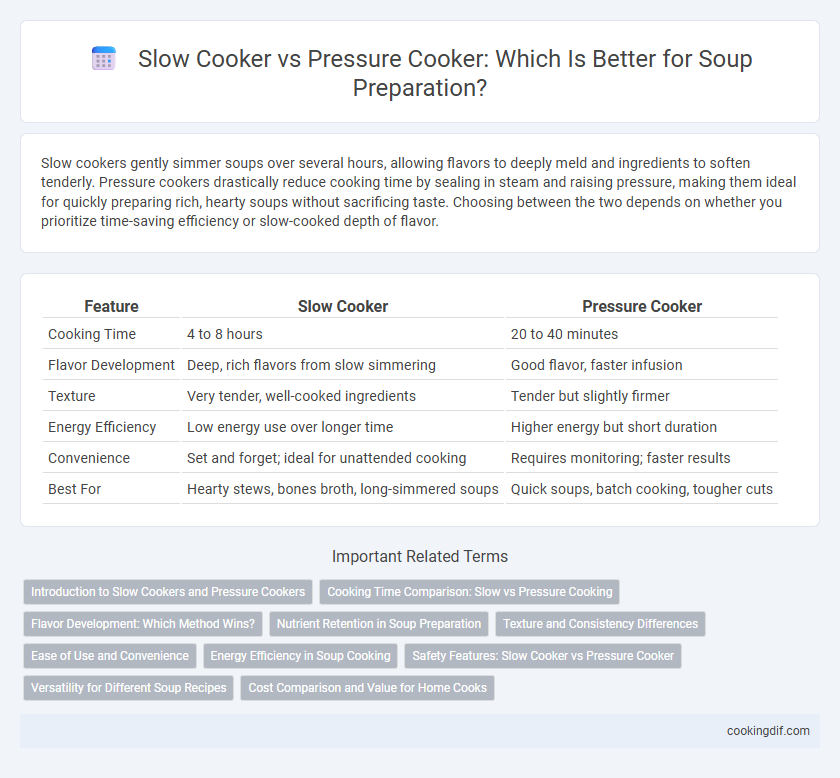Slow cookers gently simmer soups over several hours, allowing flavors to deeply meld and ingredients to soften tenderly. Pressure cookers drastically reduce cooking time by sealing in steam and raising pressure, making them ideal for quickly preparing rich, hearty soups without sacrificing taste. Choosing between the two depends on whether you prioritize time-saving efficiency or slow-cooked depth of flavor.
Table of Comparison
| Feature | Slow Cooker | Pressure Cooker |
|---|---|---|
| Cooking Time | 4 to 8 hours | 20 to 40 minutes |
| Flavor Development | Deep, rich flavors from slow simmering | Good flavor, faster infusion |
| Texture | Very tender, well-cooked ingredients | Tender but slightly firmer |
| Energy Efficiency | Low energy use over longer time | Higher energy but short duration |
| Convenience | Set and forget; ideal for unattended cooking | Requires monitoring; faster results |
| Best For | Hearty stews, bones broth, long-simmered soups | Quick soups, batch cooking, tougher cuts |
Introduction to Slow Cookers and Pressure Cookers
Slow cookers use low, consistent heat to slowly tenderize ingredients, allowing flavors to meld over several hours, ideal for soups requiring gradual cooking like stews and broths. Pressure cookers utilize high-pressure steam to dramatically reduce cooking time while preserving nutrients and enhancing the infusion of spices, perfect for quick preparation of hearty soups. Both appliances offer distinct advantages depending on the desired cooking speed and soup texture.
Cooking Time Comparison: Slow vs Pressure Cooking
Slow cookers typically require 6 to 10 hours to prepare soups, allowing flavors to develop gradually and produce rich, tender results. Pressure cookers reduce cooking time drastically, often completing soups in 20 to 40 minutes by using high-pressure steam to speed up the cooking process. This significant time difference makes pressure cookers ideal for fast meal preparation without sacrificing flavor depth.
Flavor Development: Which Method Wins?
Slow cookers excel in flavor development by allowing ingredients to simmer gently over several hours, enabling complex flavors to meld and deepen thoroughly. Pressure cookers achieve quicker results by using high heat and steam, which can sometimes sacrifice the slow, nuanced flavor build-up. For rich, well-developed soups, slow cookers typically offer superior taste profiles due to prolonged cooking time.
Nutrient Retention in Soup Preparation
Slow cookers maintain low, consistent temperatures that help preserve delicate nutrients and flavors in soups over extended cooking times, minimizing nutrient loss compared to high-heat methods. Pressure cookers drastically reduce cooking time by using steam and high pressure, which effectively retains more heat-sensitive vitamins like vitamin C and B-complex due to shorter exposure to heat and oxygen. Selecting between slow cooker and pressure cooker depends on balancing cooking time with desired nutrient retention, where pressure cookers tend to excel in preserving nutrients during rapid soup preparation.
Texture and Consistency Differences
Slow cookers gently simmer soup over several hours, yielding tender ingredients and a rich, smooth consistency as flavors meld gradually. Pressure cookers use high pressure and heat to cook soup rapidly, often preserving vegetable firmness and producing a slightly chunkier texture with distinct ingredient layers. Choosing between the two depends on whether a creamy, cohesive soup or a heartier, more textured result is preferred.
Ease of Use and Convenience
Slow cookers excel in ease of use with simple settings and minimal monitoring, allowing soups to simmer gently over hours for enhanced flavor. Pressure cookers significantly reduce cooking time, making them ideal for quick meal preparation, but require more attention to sealing and release processes. Both appliances offer convenience, but slow cookers suit hands-off cooking while pressure cookers prioritize speed without sacrificing texture.
Energy Efficiency in Soup Cooking
Slow cookers use low, steady heat over long periods, consuming less electricity compared to pressure cookers that operate at high pressure and temperature for shorter durations. Pressure cookers achieve faster cooking times, which can reduce overall energy use despite higher power draws during operation. For soup preparation, choosing between slow cookers and pressure cookers depends on balancing cooking time with energy consumption preferences, where pressure cookers often provide greater energy efficiency through rapid heat application.
Safety Features: Slow Cooker vs Pressure Cooker
Slow cookers operate at low temperatures over extended periods, reducing the risk of burns or explosions, and typically include automatic shut-off features for added safety. Pressure cookers utilize high-pressure steam to significantly speed cooking times but must have secure locking lids, pressure release valves, and sensors to prevent accidents related to excessive pressure buildup. Both appliances require adherence to manufacturer guidelines, but modern pressure cookers incorporate advanced safety mechanisms that minimize risks compared to older models.
Versatility for Different Soup Recipes
Slow cookers excel in preparing soups that benefit from long, slow simmering, enhancing flavors and tenderizing ingredients like beans, stews, and bone broths. Pressure cookers significantly reduce cooking time while preserving nutrients, ideal for quick soups such as lentil or vegetable varieties. Choosing between the two depends on recipe complexity and desired texture, as slow cookers offer hands-off convenience for depth, while pressure cookers provide speed and efficiency for diverse soup preparations.
Cost Comparison and Value for Home Cooks
Slow cookers generally have a lower upfront cost compared to pressure cookers, making them a budget-friendly option for home cooks seeking ease of use and hands-off cooking. Pressure cookers, although pricier, offer faster cooking times and retain more nutrients, providing greater value for those prioritizing efficiency and health benefits. When balancing initial expense against long-term utility, home cooks looking for cost-effective meal prep often prefer slow cookers, whereas pressure cookers appeal to those valuing speed and nutrient preservation.
Slow Cooker vs Pressure Cooker for preparation Infographic

 cookingdif.com
cookingdif.com